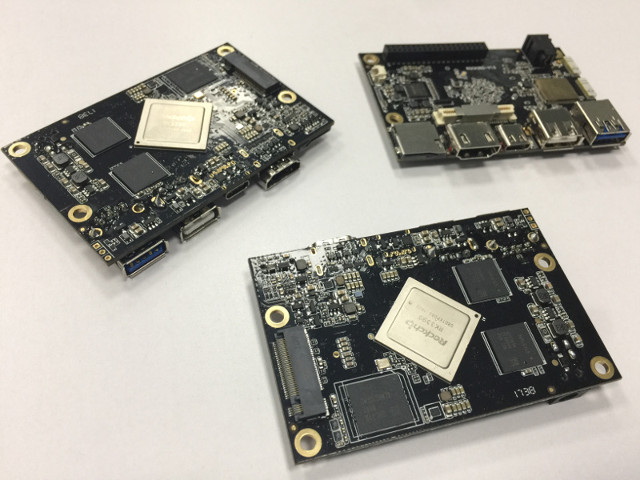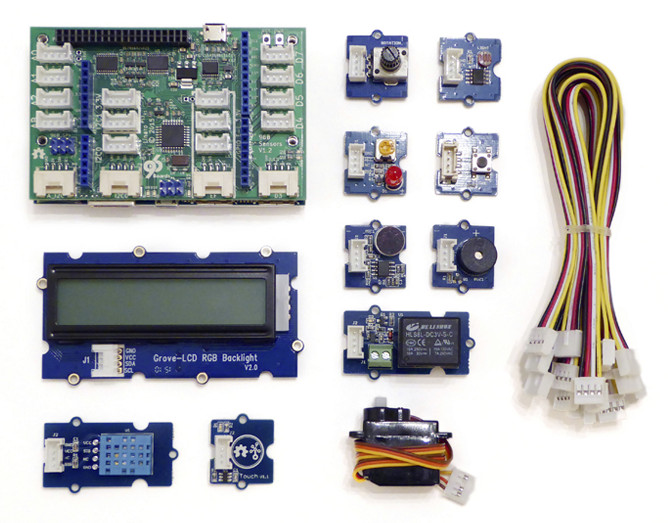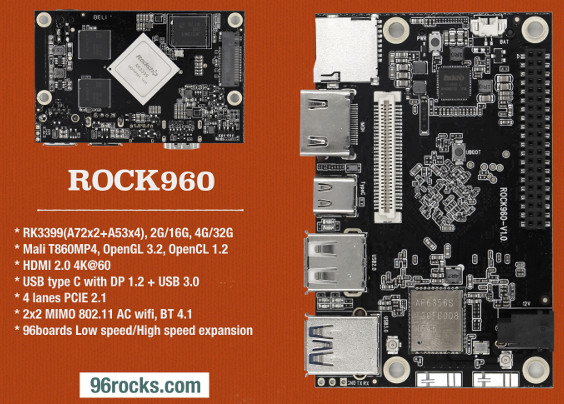So it looks like Rockchip is soon going to join 96Boards family with Rock960 board. Developed by a Guangzhou based startup called Varms, the board will be powered by Rockchip RK3399 hexa-core SoC, and comply with 96Boards CE specifications.
Rock960 board preliminary specifications:
- SoC – Rochchip RK3399 hexa-core big.LITTLE processor with two ARM Cortex A72 cores up to 1.8/2.0 GHz, four Cortex A53 cores @ 1.4 GHz, and ARM Mali-T860 MP4 GPU with OpenGL ES 1.1 to 3.2 support, OpenVG1.1, OpenCL 1.2 and DX 11 support
- System Memory – 2 or 4GB RAM
- Storage – 16 or 32GB eMMC flash + micro SD card
- Video Output – 1x HDMI 2.0 up to 4K@60 Hz with CEC and HDCP
- Connectivity – WiFi 802.11ac 2×2 MIMO up to 867 Mbps, and Bluetooth 4.1 LE (AP6356S module) with two on-board antennas, two u.FL antenna connectors
- USB – 1x USB 2.0 host port, 1x USB 3.0 port, 1x USB 3.0 type C port with DP 1.2 support
- Expansion
- 1x 40 pin low speed expansion connector – UART, SPI, I2C, GPIO, I2S
- 1x 60 pin high speed expansion connector – MIPI DSI, USB, MIPI CSI, HSIC, SDIO
- 1x M.2 key M PCIe connector with support for up to 4-lane PCIe 2.1 (max bandwidth: 2.0 GB)
- Misc – Power & u-boot buttons. 6 LEDS (4x user, 1x Wifi, 1x Bluetooth)
- Power Supply – 8 to 18V DC input (12V typical) as per 96Boards CE specs; Battery header
- Dimensions – 85 x 54 mm (96Boards CE form factor)
 The board will support Android (AOSP), Ubuntu, the Yocto Project, and Armbian. The website shows the word “official” for the first three, and lists Canonical as partner. The company will also offer various at least one expansion board, and starter kit based on Seeed Studio Grove system with a mezzanine board with plenty of Grove headers, an LCD display, and various Grove modules like buzzers, relays, buttons, LEDs, temperature sensors, and so on.
The board will support Android (AOSP), Ubuntu, the Yocto Project, and Armbian. The website shows the word “official” for the first three, and lists Canonical as partner. The company will also offer various at least one expansion board, and starter kit based on Seeed Studio Grove system with a mezzanine board with plenty of Grove headers, an LCD display, and various Grove modules like buzzers, relays, buttons, LEDs, temperature sensors, and so on.
 Rock960 is both simpler and smaller than other RK3399 boards such as Firefly-RK3399 and VS-RK3399, so I’d expect it to be cheaper, hopefully below $100, once it becomes available. The website is still very much under construction, but you may find few more details there.
Rock960 is both simpler and smaller than other RK3399 boards such as Firefly-RK3399 and VS-RK3399, so I’d expect it to be cheaper, hopefully below $100, once it becomes available. The website is still very much under construction, but you may find few more details there.
[Update: Rock960 board with 2GB can be pre-ordered for $99.00 on Seeed Studio]
Thanks to mininodes for the tip.

Jean-Luc started CNX Software in 2010 as a part-time endeavor, before quitting his job as a software engineering manager, and starting to write daily news, and reviews full time later in 2011.
Support CNX Software! Donate via cryptocurrencies, become a Patron on Patreon, or purchase goods on Amazon or Aliexpress. We also use affiliate links in articles to earn commissions if you make a purchase after clicking on those links.






What’s with the bottom-side SoC placement? How is heat dissipation supposed to work?
@blu
With a huge metal enclosure acting as a giant heatsink, look at ODROID HC1 to get the idea 🙂
@tkaiser
I see. I hope the vendor provides that in the box, otherwise it would be rather impractical.
i’m a bit lost with M.2 specs…
does “M.2 key M” means only SATA is available ?
btw, too bad this 96board CE standard spec doesn’t allow gigabit ethernet …
@blu
Well attaching any huge metal works surprisingly well. Tested personally with a Banana Pro and a NanoPi NEO both combined with el cheapo thermal pads in aluminium enclosures and got ~10°C less on average. At a customer they use now the same thermal pads to attach NanoPi NEO directly to the top of each rack cabinet though with all those slow SoCs it’s not really needed anyway.
With such powerful SoCs like RK3399 I believe the only reasonable placement on any PCB is like it’s done here since this is the only chance to get good but fanless heat dissipation (see also UP² (UP Squared board) PCB design and standard enclosure)
Exactly the opposite. M key allows for ‘PCIe ×4, SATA and SMBus’ and since RK3399 has neither SATA nor SMBus… If the company is smart they use a thick metal base plate both providing heat dissipation and mount options for 2242, 2260 and 2280 M.2 cards though AFAIK the only cards that would really fit here are M.2 PCIe SSDs and they’re all 2280 today. But maybe they provide another such baseplate with a real PCIe 2.1 x4 slot…
BTW: wrt SSDs you have to take care again since there’s PCIe 2.1 x4 on the M.2 connector but there are PCIe SSDs available with PCIe 3 x2 –> combining them you end up with half of the theoretical bandwidth wasted since PCIe 2.1 x2 will be used. So to get the max out of this connector you have to choose PCIe 3 x4 SSDs to end up with PCIe 2.1 anyway (just 40% of the possible bandwidth then)
Hehe, all the time this M.2 confusion 🙂
RK3399 is huge if you compare it to Kirin 960 🙂
28 nm HKMG vs TSMC 16 nm FFC
@m][sko
The Kirin has almost everything integrated (at least DRAM) and can AFAIK only handle one display (?). If you look at RK3399’s bottom there are ~900 solder balls so even with a die shrink I doubt they can shrink the package that much 🙂
This might become a very popular 96board (depends on price). IIRC rk3399 should have upstream support. It’s the same chip as in Samsung Chromebook Plus and ASUS Chromebook Flip C101.
Huge CPU on the right side for passive cooling, wide voltage power supply, USB3, WIFI MIMO, 40pins user friendly header : the first succes story board!
Hope the price stay in the sucess story range :p
Maybe i will forget buying Rock64
@davidlt
Yes, RK3399 (as well as RK3328) are amongst the Rockchip ‘open sourced’ SoCs. With both SoCs some stuff surprisingly is fixed/supported by Rockchip themselves already in their upstream mainline kernel submissions and will only later be backported to their respective ‘vendor kernel’ (4.4 BSP for Linux and AFAIK 3.10 for Android).
A bit sad the 96board specification didn’t take care of RGMII since these SoCs also show nice Gigabit Ethernet performance 🙂 But hey, the use case shown above (tons of boring low speed accessories attached) can be done with this board showing zero CPU utilization all the time 😉
@tkaiser
This is probably due to Google Chromebook (minimum 5 year support). Btw, 4.4 will be the first 6-year LTS. Google announced that kernel community will be doing 6-year extended LTS (not specific to Google Android or Chromebook, but will help them __a lot__).
That’s really interesting especially given that all the RK stuff is developed in the open. Lets wait and see. I would assume once the price tag of the board above is known Xunlong will officially announce their own RK3399 for $5 less 😉
At least based on the PCB pictures that were ‘leaked’ back in April the ‘RK3399 Orange’ will be ready for a lot more use case out of the box (Gigabit Ethernet exposed, tons of connectors, one SATA port provided by an ASM106x, a mPCIe slot to be combined with $whatever)
@tkaiser
This is all very good, but how about active cooling? After using the A8040 for sufficiently long I have my doubts about 2x A72 + MP4 @28nm running throttle-free at their respective full clocks with passive cooling. We shall see, I guess.
@nobe
It appears that a Mezzanine board is in the works for GigE plus POE. https://www.96boards.org/product/ethernetcard/
@tkaiser
Thanks for all the suggestion.
M.2 is just the connector in a small footprint with many pins available. We have routed the RGMII and 4 lanes PCIE on the connector. The initial intent was not to use PCIE SSD(you can not reach the max speed of the SSD anyway). We are planning to release a custom pcie adapter board with GbE and 4 SATA(pci to sata).
I just posted a video of it here https://www.youtube.com/watch?v=j_6ZUAc3P5E
@Charbax
Nice. Some new key points:
* Boots mainline Linux kernel already
* Likely price: $99 for 2GB/16GB; $139 for 4GB/32GB
* Machine learning library released for Mali-T860MP4 GPU
@vamrs
Just to double check, you mean 4 x SATA connectors? I.e. I could use this board for NAS with RAID?
@Ray Knight
That’s USB2 Ethernet, not even half of the bandwidth compared to what RK3399 provides natively (RGMII)
@vamrs
Nice to hear that RGMII is also routed to the M.2 connector (violating specs somewhat?)
@davidlt
Even with just a single PCIe 2.x lane you can always add a Marvell 88SE9215 for example and get 4 ‘native’ SATA ports. Since it’s Marvell you can add on each port a good Marvell SATA port multiplier and then have 20 SATA drives already. And all of this is just mad since expensive, slow and not taking care of data integrity. 🙂
(I deal with RAID for a living and that’s why I try to avoid the stupid/anachronistic modes whereever possible 😉 — you find some stuff to consider in Armbian forum when doing a web search for eg. ‘Marvell based 4 ports mPCI SATA 3.0’ or ‘grab one of the new Denverton mainboards that support QAT (QuickAssist technology) to be paired with ZoL 0.7 or above’)
@cnxsoft
i guess he refers to the ARM Compute Library, i think it’s not only for Mali-T860MP4 GPU but for all midgard & bifrost mali GPUs
@vamrs
i agree with tkaiser, a metal enclosure acting as a fanless heatsink is a must have IMHO.
i also like his idea of a case big enough and having screw holes to fasten your planned pcie adapter board.
@Ray Knight
In my opinion it’s too late. The 96boards specification is pure crap apparently designed to kill ethernet usage. And it works 🙁 It’s sad they did this at the moment ARM chips are starting to enter the server market. Some will say that there’s the (much larger) 96board enterprise format. But clearly the NAS form factor is what helps transitionning from the development board to the server board and they’re making it the hardest possible. Adding extra parts is a no-go for most use cases (form factor, moving parts, pricing, etc).
For now every time I see a board mentionning 96board compliance, I think “oh no, another one for the trash”.
For those looking for NAS usage with that “4 ports PCIe SATA adapter”, this would add to the price so it’s IMO, better to go for HP Microserver G1610 which here in Europe costs ~ €200. Then you can even run ZFS (ZoL) using ECC RAM!
@fossxplorer
I’m looking for non-x86 NAS stuff. And maybe a light non-x86 desktop. But nothing out there seems really appropriate. Or at least not at a halfway reasonable price.
Four months on. Will this board still materialise ?
I have just received an email:
@Robert
For some reasons (maybe work on software support), 96Boards always seem to take forever to launch.
For example, Dragonboard 820c was unveiled in February of last year, as it has yet to launch, but we’re being told it should be available very soon.
@cnxsoft
OK, I didn’t realise that. I hope that it is available soon because I’ve been holding out. I need a new board by mid February. The 4GB/32GB version.
Do you happen to know if a USB to UART module board (based on CP2104) will be made available, for console debugging from a terminal ?
@Robert @cnxsoft
I already have the answer to my question. A colleague pointed me 2 boards at the 96boards website which add this functionality to any board in the 96boards lineup. The “UART Serial Mezzanine” and “Arrow Audio Mezzanine”.
I know of one other premium arm board that is waiting on busy programmers, but I suggest working software, is better than the Orange Pi build, make and forget model of product launch.